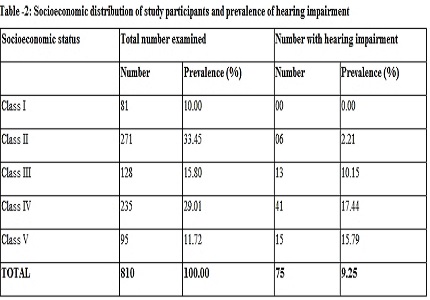A cross-sectional study to assess hearing impairment in school going children aged 6 to10 years of Ranchi City
Abstract
Introduction: Hearing loss of any type or degree if occurs in infancy or childhood can interfere with the development of a childrens spoken language, academic performance, reading and writing skills. The objective of the present study was to determine the prevalence of hearing impairment among school going children aged 6 to10 years of RANCHI city and to identify the etiological factors of diminished hearing and their distribution patterns.
Methods: 810 school going children of 6 to 10 years age group selected from four schools of the city. The schools were selected from 208 schools by simple randomization method encompassing children from all socioeconomic backgrounds. Clinical ENT examination was done followed by otoscopy with a portable otoscope and tuning fork tests with 512 Hz tuning fork, both of which were used as screening tests. Pure Tone Audiometry, which is the confirmatory test for hearing impairment and Tympanometry was done only in suspected cases of Otitis media with effusion (OME).
Results: A total of 810 children were examined of which 75 had hearing impairment out of which prevalence rate of hearing impairment was significantly more in girls as compared to boys. There was a statistically significant inverse relationship observed between prevalence of hearing impairment and socioeconomic status.
Conclusion: Screening tests at school entry levels and ear health care education in community can minimize prevalence of ear pathologies and hence hearing impairment as most of the causes are treatable.
Downloads
References
2. Flexer C. Facilitating hearing in young children. San Diego: Singular Publishing; 1999.
3. Centers for Disease Control and Prevention (CDC). Serious hearing impairment among children aged 3-10 years--Atlanta, Georgia, 1991-1993. MMWR Morb Mortal Wkly Rep. 1997 Nov 14;46(45):1073-6.
4. Smith AW.WHO Activities for Prevention of Deafness and Hearing impairment in children. [Online]. Available from: URL: http://ftp.who. int/nmh/ Blindness- Library/EN/Deafness/PDFdocs/ICPA3.pdf
5. Gell FM, Whilte EM, Newell K ,Mackenzie I, Smith A, Thompson S et al. Practical Screening priorities for hearing impairment among children in developing countries. Bulletin of the World Health Organization 1992; 70(5): 645-55.
6. Mishra SC, Shukla G K, Bhatia N, Mishra A, Kandpal N. Ear health care and promotion of hearing amongst school children of slum areas. Indian J. Otolaryngol.1992; 10: 18-23.
7. Kumar S, D’Mello J. Identifying children at risk for speech and hearing disorders A preliminary survey report from Hyderabad, India. [Online]. Available from: URL: http://www.dinf.ne.jp/doc/english/asia/resource /apdrj/v172006/identify-children.html [cited 2006].
8. Jacob A, Rupa V, Job A, Joseph A. Hearing impairment & otitis media in a rural primary school in South India. Int J Pediatr Otorhinolaryngol 1997; 39(2): 133-8. [PubMed]
9. Kalpana R, Chamyal PC. Study of prevalence and aetiology of the hearing loss amongst school going children. Indian J Otolaryngol Head Neck Surg. 1997 Apr;49(2):142-4. doi: 10.1007/BF03023793. [PubMed]
10. Rao RS, Subramanyam MA, Nair NS, Rajashekhar B. Hearing impairment and ear diseases among children of school entry age in rural South India. Int J Pediatr Otorhinolaryngol. 2002 Jun 17;64(2):105-10.
11. Tuli BS, Parmar TL, Kumar S.Incidence of Deafness in School Going Children. Indian J Otolaryngol 1988; 40: 137-8.
12. Pal J, Bhatia ML, Prasad BG, Dayal D, Jain PC. Deafness among the urban community--an epidemiological survey at Lucknow (U.P.). Indian J Med Res. 1974 Jun;62(6):857-68. [PubMed]
13. Mishra SC, Shah PK, Kandpal N.Hearingretardation amongst school age Bhutaneserefugees. Indian J Otolaryngol 2002; 8(1): 5-8.
14. McPherson B, Holborow CA. A study of deafness in West Africa: the Gambian Hearing Health Project. Int J Pediatr Otorhinolaryngol. 1985 Nov;10(2):115-35. [PubMed]
15. Sharma H, Bhushan V, Dayal D, Mishra S. Preliminary study of hearing handicap in school going children. Indian J Laryngol Otol Head Neck Surg 1992; 1(3): 119-24.
16. Olusanya BO, Okolo AA, Aderemi AA. Predictors of hearing loss in school entrants in a developing country. J Postgrad Med. 2004 Jul-Sep;50(3):173-8; discussion 178-9. [PubMed]
17. Lyn C, Jadusingh WA, Ashman H, Chen D, Abramson A, Soutar I. Hearing screening in Jamaica: prevalence of otitis media with effusion. Laryngoscope. 1998 Feb;108(2):288-90. [PubMed]
18. Olusanya BO, Okolo AA, Ijaduola GT. The hearing profile of Nigerian school children. Int J Pediatr Otorhinolaryngol. 2000 Oct 16;55(3):173-9.



 OAI - Open Archives Initiative
OAI - Open Archives Initiative


